
October 18
1748 Treaty of Aix-la-Chapelle: The War of the Austrian Succession ends, recognizing the annexation of Silesia by Frederick the Great of Prussia. [For further information, click here.]
1767 Mason and Dixon draw a line: On this day in 1767, Charles Mason and Jeremiah Dixon complete their survey of the boundary between the colonies of Pennsylvania and Maryland as well as areas that would eventually become the states of Delaware and West Virginia. The Penn and Calvert families had hired Mason and Dixon, English surveyors, to settle their dispute over the boundary between their two proprietary colonies, Pennsylvania and Maryland. [For further details, Click here]
1867 U.S. takes possession of Alaska: On this day in 1867, the U.S. formally takes possession of Alaska after purchasing the territory from Russia for $7.2 million, or less than two cents an acre. The Alaska purchase comprised 586,412 square miles, about twice the size of Texas, and was championed by William Henry Seward, the enthusiasticly expansionist secretary of state under President Andrew Johnson. [For further details, Click here]
1898 Birth: Lotte Lenya (original name Karoline Blamauer):
Born in Vienna, Austria--died November 27, 1981, New York, New York, U.S.), Austrian actress-singer who popularized much of the music of her first husband, the composer Kurt Weill, and appeared frequently in the musical dramas of Weill and his longtime collaborator Bertolt Brecht. . . . She married Weill in 1926 and appeared in the controversial Brecht-Weill work Mahagonny (“Little Mahagonny”) at the Baden-Baden Festival in 1927. She alternated in the roles of Jenny and Lucy in Die Dreigroschenoper (1928; “The Threepenny Opera”) and starred in other Weill vehicles. . . .
Fleeing Nazi Germany, Lenya and Weill went to Paris in 1933. . . . From Paris the Weills moved to New York City. . . .After his death in 1950, she returned to the stage . . . and, throughout the 1950s, played in revivals of previous plays, most notably the long-running, off-Broadway production of The Threepenny Opera, as well as in several Kurt Weill Memorial Concerts. Lenya also played in the revue Brecht on Brecht (New York City and London, 1962), Mother Courage and Her Children (at the Ruhr Festival, Recklinghausen, West Germany, 1965), and Cabaret (1966).
Lenya also appeared in several films, including Die Dreigroschenoper (1930), The Roman Spring of Mrs. Stone (1960), From Russia with Love (1963), and The Appointment (1969). [For further information, click here.]
1912 First Balkan War: This little known but pivotal conflict breaks out this day between the members of the Balkan League, Serbia, Bulgaria, Greece and Montenegro, and the Ottoman Empire.
1914 Various:
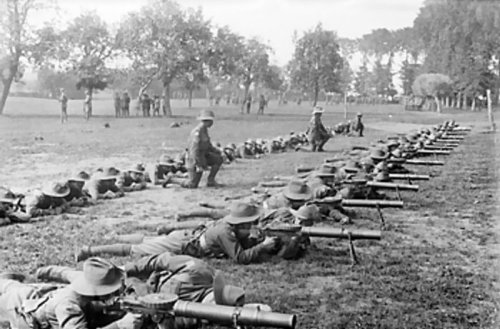
World War I: The First Battle of Ypres begins when the British capture Ypres. British-held Ypres (Ypern, or Ieper—or Wipers, to the Tommies), an ancient Flemish weaving town, is the major obstacle blocking the Germans from their initial objective of the channel ports of Calais, Dunkirk, and Boulogne. With the loss of Ypres, England itself could well be threatened. Warns The Times: "Now that the war is reaching the climax of its violence" the capture of the channel ports would enable the Germans to launch a landing of "an expedition in England for the purpose of compelling us to sign a disastrous peace."
List Regiment (Oct 11 - 20):
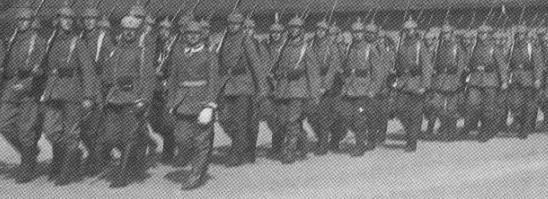
Infantry Recruit Adolf Hitler's 1st Company, 16th Bavarian Reserve Infantry, train at Lechfeld, at the confluence of the Lech and the Danube, seventy miles west of Munich. [For further details, Click here.]
1915 World War I: Various: Third Battle of the Isonzo:
List Regiment (Oct 4, 1915 - Feb 29, 1916):

Gefreiter Adolf Hitler's regiment serves with 16 Reserve Infantry Regiment at Fromelles. [For further details, Click here.]
1916 List Regiment: (Oct 9 - Dec 3):
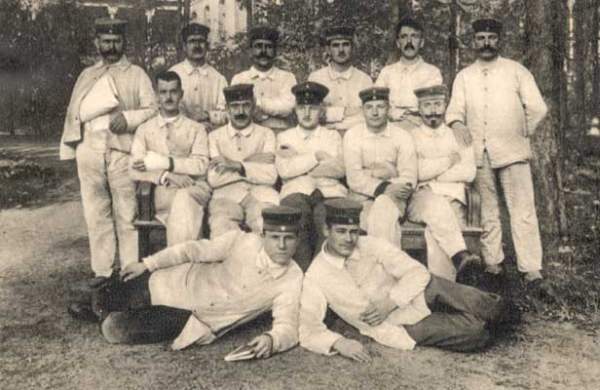
Hitler, who had been fighting almost continuously for two years, finds himself on a hospital train headed for a Red Cross hospital in Beelitz, near Berlin. While his wound is serious, he will recover quickly, and will later write Balthaser Brandmayer: "Am suffering from hunger-induced typhus because I cannot eat bread; additionally I am adamantly denied any sort of jam." [For further details, Click here.]
1917 List Regiment: (October 17-29)

Dispatch Runner Gefreiter Adolf Hitler rejoins his old regiment, now holding down a series of trenches in front of Laon near the Chemin des Dames. While there is "no danger of being taken by surprise, for the canal lay as a natural obstacle between the lines of trenches". But it is still necessary to "build a robust line [since] the highly desired town of Laon lay to our rear . . . . In the first few weeks, we often suffered strong enemy fire. This eased significantly however, in weight as in violence, in December so that one may speak of enjoying Christmas in a quiet sector. [For further details, Click here.]
1918 World War I: Various: Meuse-Argonne:
Adolf Hitler (Oct 15 - Nov 10):
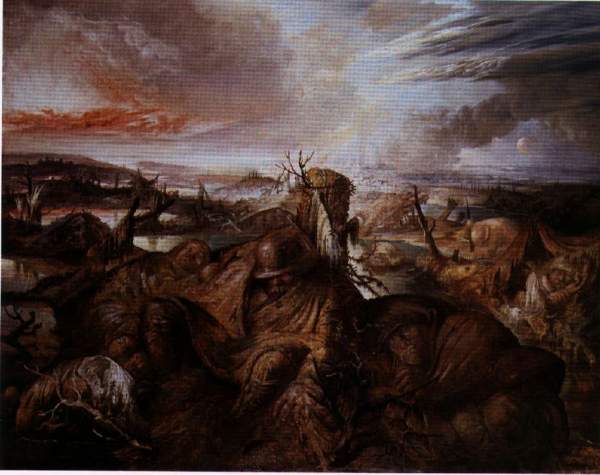
Gefreiter Adolf Hitler, blinded in a gas attack near Werwick on Oct 14, recovers in the Prussian Reserve Hospital at Pasewalk near Berlin. The doctors at this army hospital, on the cutting edge of medical treatments for gassed soldiers, provide Hitler with very good care, and his sight slowly and painfully begins to return to him over these few weeks. Hitler falls into a deep depression. After over four years on the front lines, his fighting days are over. In four years of war, the List Regiment has lost 3,754 dead, 8,795 wounded, with 678 taken prisoner. This is somewhat above the average for the German Armed Forces as a whole. [For further details, Click here.]
Czechs seize Prague and renounce Hapsburg rule:
At this grave moment, when the Hohenzollerns are offering peace in order to stop the victorious advance of the allied armies and to prevent the dismemberment of Austria-Hungary and Turkey, and when the Hapsburgs are promising the federalization of the Empire and autonomy to the dissatisfied nationalities committed to their rule we, the Czecho-Slovak National Council, recognized by the allied and American Governments as the Provisional Government of the Czecho-Slovak State and nation, in complete accord with the declaration of the Czech deputies made in Prague on January 6, 1918, and realizing that federalization and, still more, autonomy, means nothing under a Hapsburg dynasty, do hereby make and declare this our declaration of independence. [For further details, Click here.]
1922 United Kingdom: The British Broadcasting Co., Ltd. (later the British Broadcasting Corp. of BBC) iss founded.1923 Weimar: Bavaria, backed by Wuerttemberg and Saxony, breaks diplomatic relations with Berlin. The local Bavarian Reichswehr revolts against the Reich.
1929 Weimar: President von Hindenburg condemns the Nationalist referendum which would express disapproval of officials pledged to the Young Plan.
1935 Nazi Eugenics: Hitler's Germany promulgates the Marriage Protection Law, forbidding persons with hereditary diseases to marry.
1939 World War II: Various: President Roosevelt
From the Reich Foreign Minister (Ribbentrop) to the German Ambassador in the Soviet Union (Schulenburg):

For the Ambassador in person. At an occasion soon to arise, I intend to speak in public about the foreign political situation and shall then, with reference to Chamberlain's last speech, deal with the future aims of England and the British propaganda of lies.
In this connection I would also like to refute a lie recently circulated in quite specific form by the enemy press, alleging that during my stay in Moscow I had asked the Soviet Union for military assistance, but had met with an outright refusal. I propose to say on this subject approximately the following: "In its grave disappointment at the recent development in the international situation, which has been strongly influenced by the establishment of friendly relations between Germany and the Soviet Union, British propaganda has left nothing untried to discredit and disturb this development and German-Russian relations. In its well-known manner, it stopped at nothing and has made use of the grossest and most absurd lies. Thus, for instance, it has circulated the statement that in the Moscow negotiations I had asked Herr Stalin for military assistance against Poland, France, and England. To this, Herr Stalin, however, is said to have given only the tart reply: 'Not a single soldier.'
But what in reality was the course of these Moscow negotiations? Let me reveal it to you: "I came to Moscow on August 23 for the purpose of negotiating and concluding in the name of the Fuehrer, a non-aggression pact with the Soviet Union. I commenced the negotiations with Stalin and Molotov with the statement that I had not come to Moscow, as the British and French delegates had come at the time, to ask the Soviet Union for armed assistance in case a war should be forced upon the German Government by England. The German Government was not in need of assistance for this contingency, but would, in this event, have sufficient military strength to take up the struggle alone against Poland and its Western foes and to carry it to a victorious conclusion.
To this, Stalin, with his characteristic clarity and precision, replied spontaneously: 'Germany was taking a proud attitude by rejecting at the outset any armed assistance from the Soviets. The Soviet Union, however, was interested in having a strong Germany as a neighbor and in the case of an armed showdown between Germany and the Western democracies the interests of the Soviet Union and of Germany would certainly run parallel to each other. The Soviet Union would never stand for Germany's getting into a difficult position.' I thereupon thanked Stalin for his clear and precise statement and told him that I would report to the Fuehrer on this broad-minded attitude of the Soviet Government. Thus the German-Russian negotiations were opened and this exchange of views created from the outset a broadminded and friendly climate, in which within 24 hours the Non-aggression Pact and, in the course of further developments, at the end of September, the Boundary and Friendship Treaty were concluded.
Upon the political foundation, it was likewise decided immediately to inaugurate a comprehensive economic program, the implementation of which is now being discussed at Moscow. Germany has need of the raw materials of the Soviet Union and the Soviet Union has need of manufactured articles. There is no reason why the flourishing trade of the past between the two nations should not soon revive.
On the contrary, I am firmly convinced that the former traditional friendship between Germany and Russia has now been restored, and that it will grow stronger and stronger and that the exchange of goods, which is complementary by nature, will result in an undreamed-of prosperity for both nations in the future. Upon the same political foundation, the German-Soviet declaration of September 28, 1939, has also been agreed upon, to the effect that both Governments would work toward the restoration of peace upon conclusion of the Polish campaign. In case these efforts should fail-as they have-the responsibility of England and France for the continuation of the war would be established and at the same time provision would be made for a consultation between the Government of the Reich and the Soviet Government, in this contingency, on the necessary measures to be taken. These consultations are now under way and are proceeding in the same friendly spirit as the Moscow negotiations, and on the firm basis of kindred interests. In this connection, we expect an early visit of Herr Molotov to Berlin.
I believe that this brief account is sufficient to sink once and for all the whole raft of lies of the British Ministry of Lies and the other blundering propaganda centers of our enemies, about the present German-Russian negotiations and the future pattern of relations between the two greatest countries of Europe." Please inform Herr Stalin as promptly as possible of the account of the Moscow negotiations as given above and wire me his approval.
Poland: Moscow prepares to hand over 30,000 Polish soldiers and refugees to the Nazis who respond with their own prisoner exchange.
1940 Holocaust: Various:
Norway:
Poland: A wall is built around the area of Warsaw designated by the Germans as a Jewish ghetto. Jews are forced not only to build the wall, but also to pay for it. The Warsaw ghetto becomes the largest ghetto established by the Germans in Poland. The section of the city chosen for the ghetto is already home to 280,000 Jews. (THP)
1941 Holocaust: Heydrich and Himmler speak by phone, agreeing not to allow any Jews to leave German territory by going overseas. (THP)
Countdown to Infamy: Soviet Spy Richard Sorge is arrested in Tokyo.
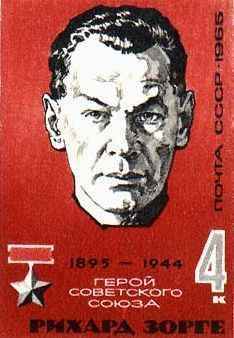
From The Unseen War in Europe by J. H. Waller:
One of the Soviet Union's most valuable secret agents in World War II was Richard Sorge operating in Tokyo. In recent times his memory has been resurrected as a Russian folk hero by a commemorative stamp bearing his dour face. Sorge, a German, was born in Russia but schooled in Berlin. He became a Soviet agent in 1925. Having arranged his own career as a correspondent for the Frankfurter Zeitung, he established an espionage organization in Tokyo.
Working in tandem with a brilliant Japanese journalist named Hotsumi Ozaki, he set about establishing a ring of spies whose tentacles reached deep into the Japanese government. Sorge also ingratiated himself with the German Embassy in Tokyo and in the mid-1930s became a trusted friend of German Military Attaché Eugen Ott, made ambassador in 1938, from whom he received valuable intelligence on German-Japanese developments. In April 1941 Ott told him in confidence that Germany had completed preparations to attack the USSR. This was electrifying information, which was confirmed by a German military visitor to Tokyo in May who explained in more detail Hitler's plans.
At about the same time Sorge learned the invasion date from another visiting German officer who had been introduced to him by Ott. June 20 was the date he gave although it actually took place two days later on June 22. It was most unlikely that Stalin would completely ignore Sorge's crucial reports. The stream of intelligence pointing to the likelihood of war between Germany and the Soviet Union was becoming a torrent.
1942 World War II: Various: From a Hitler Order (The Commando Order):
1. For some time our enemies have been using in their warfare methods which are outside the international Geneva Conventions. Especially brutal and treacherous is the behavior of the so-called commandos, who, as is established, are partially recruited even from freed criminals in enemy countries. From captured orders it is divulged that they are directed not only to shackle prisoners, but also to kill defenseless prisoners on the spot at the moment in which they believe that the latter, as prisoners, represent a burden in the further pursuit of their purpose or could otherwise be a hindrance. Finally, orders have been found in which the killing of prisoners has been demanded in principle.
2. For this reason it was already announced, in an addendum to the Armed Forces communique of 7 October 1942, that in the future, Germany, in the face of the sabotage troops of the British and their accomplices, will resort to the same procedure, that is, that they will be ruthlessly mowed down by the German troops in combat, wherever they may appear.
3. I therefore order: From now on all enemies on so-called commando missions in Europe or Africa, challenged by German troops, even if they are to all appearances soldiers in uniform or demolition troops, whether armed or unarmed, in battle or in flight, are to be slaughtered to the last man. It does not make any difference whether they are landed from ships and airplanes for their actions, or whether they are dropped by parachute. Even if these individuals, when found, should apparently be prepared to give themselves up, no pardon is to be granted them on principle. In each individual case full information is to be sent to the OKW for publication in the communique of the Armed Forces.
4. If individual members of such commandos, such as agents, saboteurs, et cetera, fall into the hands of the Armed Forces by some other means, through the police in occupied territories, for instance, they are to be handed over immediately to the SD. Any imprisonment under military guard, in PW stockades, for instance, et cetera, is strictly prohibited, even if this is only intended for a short time.
5. This order does not apply to the treatment of any soldiers who, in the course of normal hostilities, large-scale offensive actions, landing operations, and airborne operations, are captured in open battle or give themselves up. Nor does this order apply to enemy soldiers falling into our hands after battles at sea, or to enemy soldiers trying to save their lives by parachute after air battles.
6. I will hold responsible under military law, for failing to carry out this order, all commanders and officers who either have neglected their duty of instructing the troops about this order, or acted against this order when it was to be executed; a supplementary order of the Fuehrer is enclosed. This order is intended for commanders only and must not, under any circumstances, fall into enemy hands. The further distribution is to be limited accordingly by the receiving bureaus. The bureaus named in the distribution list are held responsible for the return and destruction of all distributed copies of this order and copies made thereof. "I have been compelled to issue strict orders for the destruction of enemy sabotage troops and to declare noncompliance with these orders severely punishable.
I deem it necessary to announce to the competent commanding officers and commanders the reasons for this decree. As in no previous war, a method of destruction of communications behind the front, intimidation of the populace working for Germany, as well as the destruction of war-important industrial plants in territories occupied by us has been developed in this war...
The consequences of these activities are of extraordinary weight. I do not know whether each commander and officer is cognizant of the fact that the destruction of one single electric power plant, for instance, can deprive the Luftwaffe of many thousand tons of aluminum, thereby eliminating the construction of countless aircraft that will be missed in the fight at the front and so contribute to serious damage of the homeland as well as to bloody losses of the fighting soldiers.
Yet this form of war is completely without danger for the adversary. Since he lands his sabotage troops in uniform but at the same time supplies them with civilian clothes, they can, according to need, appear as soldiers or civilians. While they themselves have orders ruthlessly to remove any German soldiers or even natives who get in their way, they run no danger of suffering really serious losses in their operations, since at the worst, if they are caught, they can immediately surrender and thus believe that they will theoretically fall under the provisions of the Geneva Convention.
There is no doubt, however, that this is a misuse in the worst form of the Geneva agreements, especially since part of these elements are even criminals liberated from prisons, who can rehabilitate themselves through these activities. England and America will therefore always be able to find volunteers for this kind of warfare, as long as they can truthfully assure them that there is no danger of loss of life for them. At worst, all they have to do is successfully to commit their attacks on people, traffic installations, or other installations and, upon being encountered by the enemy, to capitulate. If the German conduct of war is not to suffer grievous damage through these incidents, it must be made clear to the adversary that all sabotage troops will be exterminated, without exception, to the last man. This means that their chance of escaping with their lives is nil. Under no circumstances can it be permitted, therefore, that a dynamite, sabotage, or terrorist unit simply allows itself to be captured, expecting to be treated according to the rules of the Geneva Convention. It must, under all circumstances, be ruthlessly exterminated.
The report on this subject appearing in the Armed Forces communique will briefly and laconically state that a sabotage, terror, or destruction unit has been encountered and exterminated to the last man. I therefore expect the commanding officers of armies subordinate to them, as well as individual commanders, not only to realize the necessity of taking such measures, but to carry out this order with energy. Officers and noncommissioned officers who fail through some weakness are to be reported without fail or, if the circumstances require aft, e. g. if danger is imminent, to be at once made strictly accountable. The homeland, as well as the fighting soldier at the front, has the right to expect that behind their backs the essentials of nourishment as well as the supply with war-important weapons and ammunition remains secure. These are the reasons for the issuance of my decree. If it should become necessary, for reasons of interrogation, initially to spare one man or two, then they are to be shot immediately after interrogation.
1942 World War II: Various:
Caucasus: The advance of German forces toward the Black Sea port of Tuapse is halted due to difficult terrain and stubborn Soviet resistance.
Vice Admiral Halsey named new commander of the South Pacific:

On this day in 1942, Vice Adm. William F. Halsey replaces Vice Adm. Robert L. Ghormley as commander, South Pacific.
The man nicknamed "Bull" by the press began his military career as a destroyer commander during World War I. Halsey was made a captain at the age of 53, earned his naval aviator's wings, and was promoted to vice admiral in 1940. But it was the bombing of Pearl Harbor that would mark out his future for him. Halsey's task force was one of the few functioning battle groups left after the destruction of so much of the American fleet, placing him in the position of making the unpredictable and aggressive strategic decisions for which he would become renowned.
In 1942, he led surprise attacks on the Marshall and Gilbert Islands and supported the American reinforcement of troops on Samoa. It was his task force (a temporary organization of a fleet for a specific operation) that carried the 16 B-25 bombers for Jimmy Doolittle's raid on Tokyo in April 1942. By this time, Halsey's reputation for being where the action was had made him arguably the most famous American admiral of the war. And so it is ironic that he missed two major Naval engagements: the Battle of the Coral Sea (his fleet was not strategically positioned to participate) and the Battle of Midway (a severe case of dermatitis put him out of commission).
But by October 1942, Halsey was back just in time to be appointed commander of South Pacific operations by Admiral Nimitz, who wanted Vice Admiral Ghormley replaced. (Ghormley had suffered several defeats militarily and severe cases of indecision and anxiety personally.) Brilliant work in the capture of the Solomon Islands and New Guineas led to Halsey's promotion to full admiral. His career continued to strike awe in his admirers and terror in his enemies, as he succeeded in destroying the Japanese fleet in the Battle of Leyte Gulf in 1944, and commanding U.S. forces in the operations that led to the capture of Okinawa and the surrender of the Japanese there. (History.com)
1943 Holocaust: More than 1,000 Roman Jews, more than two-thirds of them women and children, are shipped off to the killing center at Auschwitz. Only 14 men and one woman will return alive after the war. 7,000 of the 8,000 Roman Jews escaped capture by going into hiding. About 4,000 of them, with the knowledge and approval of the Pope, find refuge in the numerous monasteries and houses of religious orders in Rome. A few dozen are sheltered in the Vatican itself. (Lewy) Within a month 8,360 Italian Jews had been deported to Auschwitz, where 7,749 are murdered. (THP)
1944 World War II: Various:
Volkssturm: Hitler orders the establishment of the Deutscher Volkssturm, a nation-wide militia force.
War with Japan:
Lieutenant General Joseph 'Vinegar Joe' Stilwell is recalled from China by FDR.
1945 Argentina:
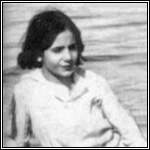
Army officer and politician Juan Peron marries popular actress Eva Duarte, better known as Evita (pictured). [For further information, click here.]
1947 Spandau Prison: From Spandau: The Secret Diaries, by Albert Speer: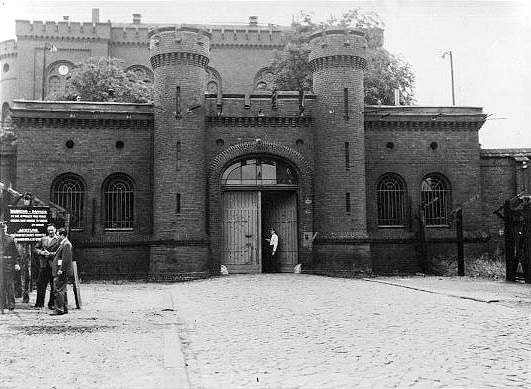
Before the service Raeder officially protested to Chaplain Casalis, in the name of five of his fellow prisoners, because the chaplain had referred to them as lepers. They were asking him to preach the Gospel and nothing else. I deliberately took the opposite view, saying: "I am not a neurasthenic. I would rather not be treated delicately. Your sermons SHOULD upset me." Much ill feeling.
1948 Death: Walther von Brauchitsch:
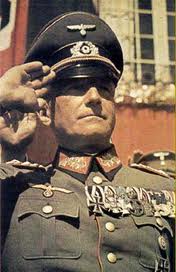
Though considered by his peers to be one the best and brightest generals of the German Army, this "man of culture, charm, and professional integrity" (Bond 1989, 95) was a fencesitter vis a vis the conspiracy [to depose Hitler]. As Army Commander-in-Chief he was in a position to give the conspirators the crucial support needed to overthrow Hitler and the Nazi regime.
Though personally averse to Nazism, Brauchitsch soon becomes inextricably bound to Hitler. He is forced to borrow 80,000 Reichmarks from the dictator in order to obtain a divorce and remarry. He is also highly ambitious and keen to succeed General Werner von Fritsch as Commander-in-Chief of the Werhmacht.
Like General Ludwig Beck, he opposed Hitler's invasion of Austria and Czechoslovakia. But unlike Beck, Brauchitsch can not bring himself to actively resist Hitler's plans for war. Asked repeatedly by Beck to persuade the entire General Staff to resign if Hitler persists in going to war over Czechoslovakia, Brauchitsch lets events take their course.
When the conspirators go into high gear with their first attempt to overthrow Hitler and the Nazi regime in September 1938, they repeatedly try to persuade Brauchitsch as Commander-in-Chief of the Army to lead the anticipated coup. But the only assurance he gives them is his famous reply: "I myself won't do anything, but I won't stop anyone else from acting."
Following the collapse of the 1938 coup attempt, Brauchitsch ignores all further appeals from Beck and the other coup plotters to use the army to overthrow Hitler before Germany is plunged into world war.
World War II:
In November 1939, prodded by Halder and the conspirators, Brauchitsch seeks an audience with Hitler to persuade him that Germany can never win a protracted general European war and to abandon his plans for conquest. Hitler flies into a rage submitting the Commander-in-Chief to a tirade of insults and abuse. Halder is horrified to see Brauchitsch emerge from the meeting "chalk white with fear." Hitler then calls a meeting of the General Staff to declare that he will smash the West within a year. He also vows to "destroy the spirit of Zossen" - a threat that panicks Halder to such an extent that he forces the conspirators to abort their second planned coup attempt.
Brauchitsch displays outstanding organizational talent in coordinating Hitler's blitzkrieg campaign against the West. Hitler rewards him and eleven other generals with the ultimate military prize - the field marshal's baton. Like Halder and many other senior officers, Brauchitsch is caught up in the euphoria of the Wehrmacht's whirlwind victory over France. Like Hitler, he mistakenly believes the campaign against Russia will be another short victorious war.
As Operation Barbarossa opens, Brauchitsch as Commander-in-Chief is forced to co-sign and implement Hitler's infamous Commissar Order and Order for Guerilla Warfare which essentially condones the mass extermination of captured Soviet prisoners of war and civilians - an act that haunts him at the Nuremburg Trials. Aghast at Hitler's decision to divert the panzer divisions of Army Group Center north towards Leningrad and south towards the Caucasus, Brauchitsch knows that it will doom the Wehrmacht's goal of capturing Moscow. Yet he makes no attempt beyond submitting memos in writing to change Hitler's mind. Predictably, Hitler blames Brauchitsch for the failure to seize Moscow, heaping so much abuse on the unfortunate field marshal that he later suffers a heart attack. In failing health, Brauchitsch is unceremoniously relieved of command and retired in December 1941 as Hitler takes direct control of the Wehrmacht.
The Conspiracy:
When the July 20th coup attempt fails, Brauchitsch falls further still in the esteem of those who stand loyal to the conspirators when he publishes an article condemning Stauffenberg's plot and praising Himmler's appointment as Commander-in-Chief of the Home Army. Worse still, he denounces several former colleagues. He later excuses himself to Halder claiming he had been forced to do so to save a relative's life. (Jewish Virtual Library)
His Fate:
In the1945-46 Nuremburg Trial, Brauchitsch is charged with complicity in Hitler's war of aggression and crimes against humanity. His defense consists of one perjured statement after another. He denies ever having received money from Hitler to remarry, that he had any foreknowledge of Hitler's war aims in 1938-1941, that he had known of the atrocities committed in Poland, or that he had ever been aware of the Commissar Order's genocidal consequences. Brauchitsch is sent to a prisoner of war camp in South Wales and brought back to Germany in 1948 to stand trial before a British court. He dies before the start of the trial.
1949 Spandau Prison: From Spandau: The Secret Diaries, by Albert Speer:
Funk underwent an operation a few days ago. The Western doctors wanted to perform it at the American hospital, but the Russian director refused to allow it. An army-type mobile operating unit was brought to Spandau. The difficult operation was carried out by a French surgeon. Three guards had to be present, because the rules require it. One fainted. There was a coffin ready at hand in the cellar. Funk is being cared for by a French nurse. We do not get to see her, since as soon as she appears we are locked up. I am just as glad, for after so many years of not being in the company of women, I am afraid of being gauche and clumsy.
1982 Death: Bess Truman: Former first lady of the USA dies in Independence, Mo., at age 97. (AP)
1989 East Germany and Hungary move toward democracy:
On October 18, 1989, the Iron Curtain nations of East Germany and Hungary take significant steps toward ending the communist domination of their countries to replace it with more democratic politics and free market economies. In Hungary, the Communist Party had disbanded on October 7. This action was followed by the razing of the barbed wire fence that had for years separated Hungary from Austria. The destruction of the fence effectively marked the end of the Berlin Wall as an impediment to travel between East and West Germany, since East Germans could now simply travel to Hungary, enter Austria, and go on from there to West Germany. Not surprisingly, the Berlin Wall came down shortly thereafter. [For further details, Click here]
Edited by Levi Bookin (Copy editor) Click to join 3rdReichStudies Disclaimer: This site includes diverse and controversial materials--such as excerpts from the writings of racists and anti-Semites--so that its readers can learn the nature and extent of hate and anti-Semitic discourse. It is our sincere belief that only the informed citizen can prevail over the ignorance of Racialist "thought." Far from approving these writings, this site condemns racism in all of its forms and manifestations.
levi.bookin@gmail.com










Fair Use Notice: This site may contain copyrighted material the use of which has not always been specifically authorized by the copyright owner. We are making such material available in our efforts to advance understanding of historical, political, human rights, economic, democracy, scientific, environmental, and social justice issues, etc. We believe this constitutes a "fair use" of any such copyrighted material as provided for in section 107 of the US Copyright Law. In accordance with Title 17 U.S.C. Section 107, the material on this site is distributed without profit to those who have expressed a prior interest in receiving the included information for research and educational purposes. If you wish to use copyrighted material from this site for purposes of your own that go beyond 'fair use', you must obtain permission from the copyright owner.
Please Note: The list-owner and the moderator of 3rdReichStudies are not responsible for, and do not necessarily approve of, the random ads placed on our pages by our web server. They are the unfortunate price one pays for a 'free' website.



